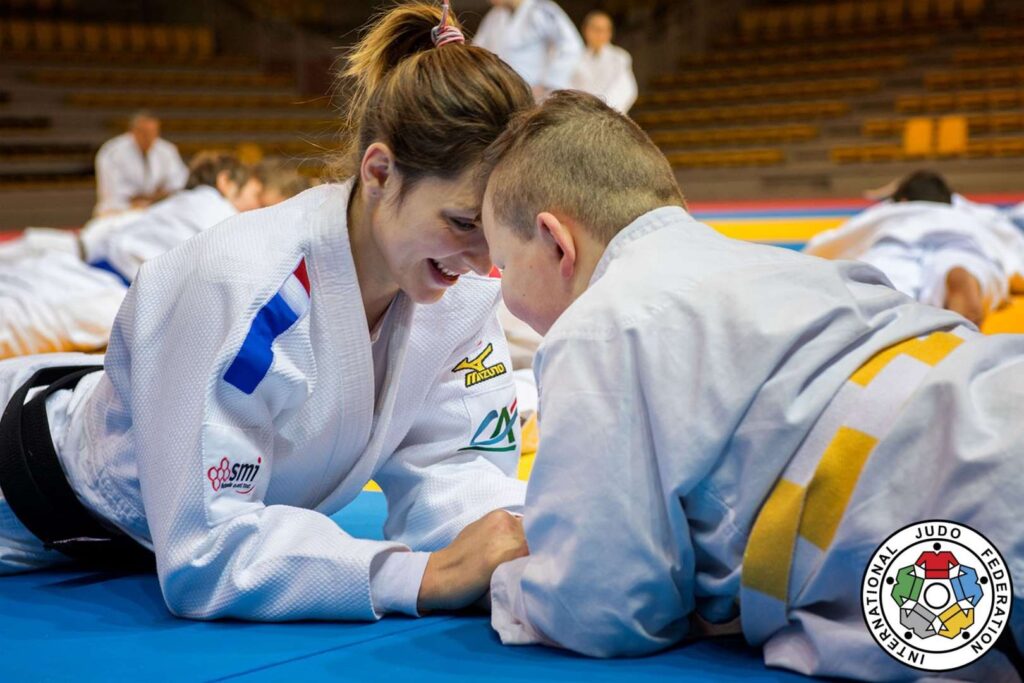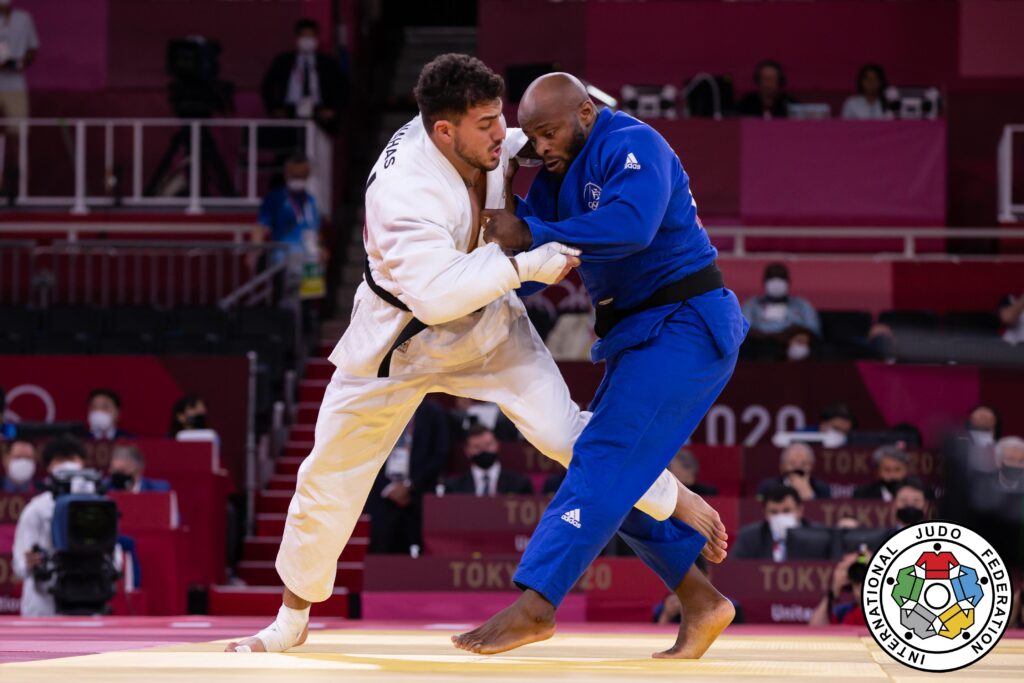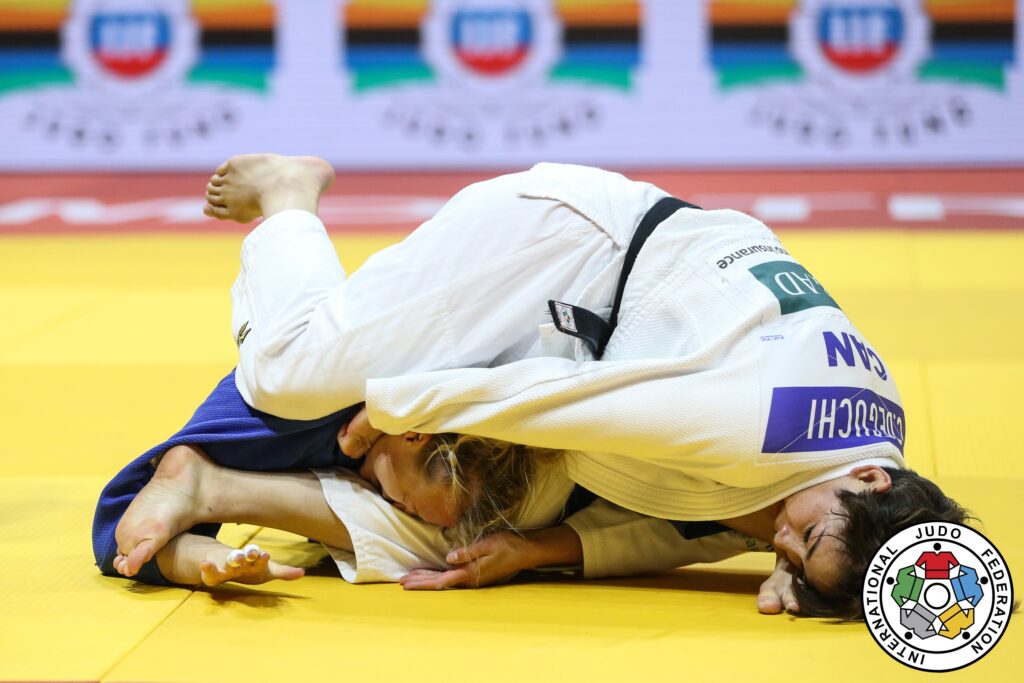Believe in Yourself
Be the Best You Can Be
What We Offer
OUR CLASSES
Junior Class (6-11)
Intermediate Class (12-15)
Senior Class (16+)
High Performance (12+)
Women's Self Defence

The Moral Code of Judo
redefine your workout
Courage
In Japan, where judo was born, the courage dimension is an integral part of Bushido
respect
The notion of respect is at the very heart of the practice of judo. Any judoka knows this from the first day they step on a tatami and will tell you without hesitation that respect is symbolised by the bow.
modesty
On the tatami, once all the roughness of social origin has been erased, once the judogi is re-hung, there is no other choice than to be modest and humble
sincerity
To be a sincere judoka is effectively to express oneself without disguising one's thought.
honour
in judo, honour consists of going to the end of one's abilities, in learning to exceed them, while respecting the rules, the decisions of referees and the opponent; all this avoiding any form of cheating.
friendship
The magic paradox of judo is that beyond the notion of opposition which is linked to the very nature of sport, it generates ties which strengthen understanding both at the individual level and at the level of nations.
politeness
When children arrive for the first time on a tatami and are interested in the practice of judo, one of the teacher's missions is to create the necessary conditions for the practice in common, with respect for each one and especially in the respect for the differences.
self control
To control our emotions, we learn by practising judo, not to repress what moves us, but on the contrary, we learn to let ourselves be invaded by emotions while preventing them from dictating our behavior.
full body workouts that leave you energized
go beyond your limits
Our Athletes Believe in Us
Here Is What They Are Saying
Train With Experts
MEET THE coaches
Scot McAlpine
NCCP Level I
Stev Young
NCCP Level II
Robin Kurpjuweit
NCCP Level I
Donovan Hoggan
NCCP Level II


Thank You For Supporting Our Judoka!


2023 / 2024 Class Schedule
Junior
Ages 6 – 8
Monday’s 6:00PM – 7:00PM
Wednesday’s 6:00PM – 7:00PM
Activities:
Develop fundamental movement skills
Introduce the ABC’S of Athleticism: Agility, Balance, Coordination and Speed. Accomplished through general exercises and a variety of Judo related games
Ukemi Waza (Falling Techniques)
Osaekomi Waza (Pinning Techniques) and Escapes
Nage Waza (Throwing Techniques)
Ne Waza Randori (Pinning Technique Open Practice, ie Competitive Style)
Nage Waza Randori (Throwing Technique Open Practice, ie Competitive Style)
Intermediate
Ages 9 – 14
Monday’s 7:00PM – 8:00PM
Wednesday’s 7:00PM – 8:00PM
Thursday’s 7:00PM – 8:30PM
Activities:
Develop fundamental movement skills
Introduce the ABC’S of Athleticism: Agility, Balance, Coordination and Speed. Accomplished through general exercises and a variety of Judo related games
Ukemi Waza (Falling Techniques)
Osaekomi Waza (Pinning Techniques) and Escapes
Nage Waza (Throwing Techniques)
Ne Waza Randori (Pinning Technique Open Practice, ie Competitive Style)
Nage Waza Randori (Throwing Technique Open Practice, ie Competitive Style)
Shime Waza (Choking Technique)
Kansetsu Waza (Joint Locking Technique)
Senior
*Ages 15 and up
(Including Beginner Adults)
Monday’s 8:00PM – 9:00PM
Wednesday’s 8:00PM – 9:00PM
Thursday’s 7:00PM – 8:30PM
Note:
Progression of training tailored to specific
learner needs and development objectives
Activities:
Develop fundamental movement skills
ABC’S of Athleticism: Agility, Balance, Coordination and Speed. Accomplished through general exercises and a variety of Judo related drills
Ukemi Waza (Falling Techniques)
Osaekomi Waza (Pinning Techniques) and Escapes
Nage Waza (Throwing Techniques)
Ne Waza Randori (Pinning Technique Open Practice, ie Competitive Style)
Nage Waza Randori (Throwing Technique Open Practice, ie Competitive Style)
Shime Waza (Choking Technique)
Kansetsu Waza (Joint Locking Technique)
Women's Self Defence
All Ages
Tuesday’s 7:00PM – 9:00PM
Welcome to the Medicine Hat Judo Club,
Your journey here is all about you. It will be what you make it and only you can decide where to start and where to end. How much energy you expend and how much time you put in will directly impact what you take with you. I could go on about our rich history, over 30 years as a part of this community but the heart of the matter is truly our people. All volunteers contributing not only time but resources to ensure we have a safe, friendly, inclusive and nurturing environment in which to practice this wonderful art of judo. We are a fully accredited dojo sanctioned by Judo Alberta and Judo Canada with a qualified and dedicated coaching staff. My own judo journey started in Saskatchewan in 1971. A single car garage was made to convert to a dojo for practice and then park the car after we left. I spent some time in Manitoba but settled at the Medicine Hat Club in 1991. Head instructor Keon Clift joined our club in 1997 and brings a wealth of competitive experience. Sensei Keon earned his black belt training in Japan as an exchange student. Our coaching ranks have been grown over the years and we now have four certified NCCP judo coaches and several more in the certification program. This allows us to offer the safest and best possible judo instruction available here. We pride ourselves on offering personalized instruction with one on one attention from our instructors as different people develop at different speeds. We are also a very intimate environment with room for no more than20 dedicated judoka. We hope that your experience here will give you a wealth of memories and a way of life that will follow you wherever you may go.
Jay Hitchen
Medicine Hat Judo Club
What is Judo?
Code of Conduct
Judo Code of Conduct
The Medicine Hat Judo Club is a safe, supportive, and friendly environment. To that end, all students are required to behave in a manner that shows respect to themselves, their peers, their instructors and the art of judo itself. When issues arise, we begin with coaching the individual on what our behavioral expectations are, why they are important and what they must do to meet them. If that doesn’t work, we will try redirection or other supportive strategies to get the athlete on track. Next, we would resort to time spent out of class and, finally, if necessary for the safety and well-being of the individual or other club members, we would ask the student to leave for one or more classes. We are far more interested in supporting people through learning proper behaviour than removing them for inappropriate behaviour.
Harassment and Bullying
We define harassment and bullying as using words or actions to deliberately hurt someone else. We do not tolerate it in our club and consider it a violation of the foundations of judo. While it is rarely an issue, when it does come up, it is dealt with as described above.
Coaching Staff
Sensei and Instructors will follow the Judo Canada Coach’s Code of Conduct. Activities will be well-communicated, timely, and well-organized. When teaching or demonstrating a skill, sensei and instructors will emphasize safety. Positive feedback and adaptive teaching methods will be used to foster engagement, learning, enthusiastic participation, and steady improvement. Injuries will be tended to immediately and appropriately. The coaching team will do what it can to ensure the best learning environment possible for participants. I took out the bit about self esteem, since that seems to be marketed towards the heads of clubs interested in getting their senior belts out for coaching.
Judoka
Participants will be required to respect all dojo rules, such as bowing properly, using respectful language in the dojo, deferring to senior judoka, and showing respect of personal space and property. They will actively cooperate with their fellow judoka and sensei. They are expected to tell the sensei of any injuries. The judoka will commit to a goal and steadily work towards it. Judoka will control their emotions in the dojo.
Parents
Parents are welcome to ask questions of the coaches about any aspect of their child’s coaching or the club in general- they’re even welcome to join in! They will be expected to support their child in their effort to improve while being mindful of the difference between supporting a child and pushing them. There will be continuous respect of their child’s opponents and fellow judoka- parents are cheerleaders! Let us do the coaching.
